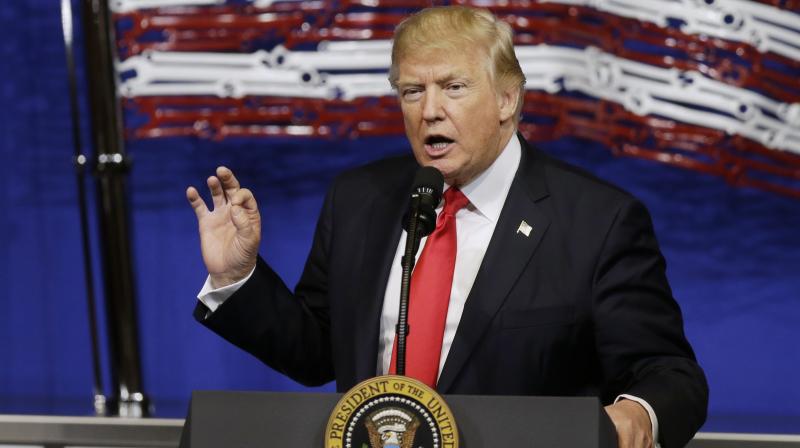Talking Turkey: Will Mr Trump grow up in his new role?

It has been a steep learning curve for Donald Trump in his first 100 days as America’s President. Typically, he observed the marker by meeting his constituency of blue-collar workers in Pennsylvania while boycotting the hallowed annual White House correspondents’ dinner, the traditional occasion to let one’s hair down, perhaps knowing the barbs that would be aimed at him.
Mr Trump has the lowest popularity rating (42 per cent) than any of his modern predecessors at this stage. But despite all the somersaults he had to undertake in his learning process, he still retains his bluster and narcissism. And, as he told the rally, he has tried to fulfil his domestic promises. He negated the Trans-Pacific Partnership (TPP), a key agreement the Obama administration had put together, and scrapped environment protection laws to try and restore prosperity to the Rust Belt, a short-term measure that will go nowhere.
To say Mr Trump is an unusual President is an understatement. He has tapped into the isolationist stream that has been part of American history for more than a century. The “America First” slogan and a turn inwards goes well with his anti-establishment constituency, but also brought on to American streets hundreds of thousands demonstrating against his anti-environment policies. Mr Trump has failed miserably on two measures he had vigorously campaigned for — repeal of Obamacare health scheme and building a wall on the Mexican border. The first was sabotaged by fellow Republican members in Congress and the latter project withdrawn from a budget that would have shut government financing. He still promises to build the wall in an age when other walls have fallen, and to replace Obamacare with proposals that have fallen between the conservatives’ desire for free choice and the political consequences of leaving millions out of health coverage.
It’s in foreign policy, however, that he has demonstrated his abilities as an acrobat. He declared the North Atlantic Treaty Organisation (Nato) obsolete, cheered Britain’s desire to leave the European Union, whose future he described in pessimistic terms, and had for months latched on to China as a rogue trader and currency manipulator.
Once in office, he praised Nato and entertained its chief in Washington, and while clinging to Brexit took a 360-degree turn on China. President Trump wined and dined President XI Jinping and now calls him a friend, and castigates North Korea for not listening to Beijing’s esteemed leader. He has come to the conclusion, as others before him, that Beijing is the key to resolving the old problem of North Korean nukes and missiles. China, for its part, is governed by its own interests by opposing the North Korean regime’s collapse, leading to a reunification of the two Koreas.
Mr Trump lost his national security adviser, Michael Flynn, within months of taking office. And although the President’s decision to fire missiles at a Syrian base after a chemical attack ascribed to the Bashar al-Assad regime won him plaudits, investigations are still on into Russia’s alleged role in the US presidential election campaign.
It is clear that Mr Trump, unlike his predecessor, is not a thinking man. His knowledge of international affairs is limited and he acts by instinct, rather than rationality, as for instance on seeing gasping children dying after the gas attack. Mr Trump’s propensity to form his worldview on the basis of Fox News television and immediately tweet his conclusion are dreaded by his foreign service team. Indeed, his budget proposals envisage large cuts in the state department and to US contributions to the UN while increasing military spending. His main advisers are former generals of various shapes and sizes.
The essential question for the United States and the world is: Can Mr Trump grow up in his new role? In some respects, he has disciplined himself by reading important statements while at other times he remains the showman, given his reality TV background, eager to take centrestage. A key difference between him and Ronald Reagan, a former actor who was California governor and later President, is that the latter appointed competent Cabinet ministers and left matters to them. Mr Trump, on the other hand, wants to keep a finger in every pie and keeps stirring the pot.
President Trump has got thus far by insulting the media, and relying on social media, particularly Twitter, as a direct method of communication with people. This will provide diminishing returns as, barring black sheep, the American media is a mature institution and is already tabulating his errors and fallacies. He can dismiss much of the criticism as “fake news”, but his habit of dressing up the truth to suit his political objectives will betray him.
President Trump is also vulnerable on another count. Previous Presidents have also had family members helping them in their official duties. But no President has flaunted his relatives as Mr Trump. His son-in-law, Jared Kushner, a businessman and a rabbi, is his official adviser, while the President’s daughter Ivanka has an office in the White House West Wing.
Knowing his sensitivities and sudden bursts of rage, foreign governments are honing in on the family to make their number with the Trump administration. The Chinese have cultivated Mr Kushner, who reportedly had business deals with Chinese firms. And German Chancellor Angela Merkel, whose official visit to Washington was symbolised by her proffered hand that remained unshaken before the press corps at the White House, invited Ivanka to Berlin for an international gathering of world women leaders.
President Trump has still to find a balance in his new role, which he is discovering each day is vastly different from his deal-making business experience.
His two executive orders barring people from Muslim-majority countries entering the US were blocked by judicial orders. Perhaps a miracle in the coming years will make him see the light.

